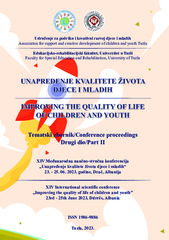Приказ основних података о документу
Jezičke sposobnosti kod starijih osoba normalnog procesa starenja
Language abilities in elderly persons of the normal aging
| dc.creator | Vuković, Mile | |
| dc.creator | Jerkić Rajić, Lana | |
| dc.date.accessioned | 2023-08-14T07:48:30Z | |
| dc.date.available | 2023-08-14T07:48:30Z | |
| dc.date.issued | 2023 | |
| dc.identifier.issn | 1986-9886 | |
| dc.identifier.uri | http://rfasper.fasper.bg.ac.rs/handle/123456789/5265 | |
| dc.description.abstract | U ovom radu prikazani su podaci o jezičkoj sposobnosti u starijem životnom dobu. Podaci govore u prilog bolje očuvanosti sposobnosti razumevanja jezika u odnosu na njegovu produkciju. Promene na jezičkom planu pripisuju se delovanju različitih uzroka: neuralne reorganizacije jezika u starijem životnom dobu, posledicama slabljenja drugih kognitivnih funkcija, perceptivnim promenama, slabljenju oralno-motoričke kontrole govora, kao i delovanja drugih bioloških faktora. Pregled dostupne literature pokazuje da je u ovoj oblasti najviše radova posvećeno istraživanju funkcije imenovanja i otkrivanju prirode grešaka u ovom domenu. Iako empirijski podaci pokazuju da neki aspekti jezika u starosti slabe, istraživači su saglasni u stavu da jezik ostaje relativno dobro očuvan u starijem životnom dobu, te da starije osobe imaju očuvane lingvističke sposobnosti koje im omogućavaju uspešnu komunikaciju sa drugim ljudima. | sr |
| dc.description.abstract | This paper presents data on language ability in the elderly. The data speak in favor of better preservation of language comprehension than its production. Changes at the language level are linked to a variety of causes: neural reorganization of language in older age, consequences of the weakening of other cognitive functions, perceptual changes, weakening of oral-motor control of speech, as well as the impact of other biological factors. A review of the available literature reveals that the majority of publications in this field are devoted to examining the naming function and revealing the nature of errors in this domain. Although empirical data indicate that some aspects of language weaken with age, researchers agree that language remains relatively well preserved in old age and that elderly people maintain linguistic abilities that enable them to communicate successfully with others. | sr |
| dc.language.iso | sr | sr |
| dc.publisher | Unapređenje kvalitete života djece i mladih | sr |
| dc.relation | info:eu-repo/grantAgreement/MESTD/Basic Research (BR or ON)/179068/RS// | sr |
| dc.rights | openAccess | sr |
| dc.rights.uri | https://creativecommons.org/licenses/by-nc-nd/4.0/ | |
| dc.source | Unapređenje kvalitete života djece i mladih,Tematski zbornik | sr |
| dc.subject | jezik | sr |
| dc.subject | starost | sr |
| dc.subject | jezičke sposobnosti kod starijih ljudi | sr |
| dc.subject | jezik u starosti | sr |
| dc.subject | language | sr |
| dc.subject | old age | sr |
| dc.subject | language abilities in the elderly | sr |
| dc.subject | language in old age | sr |
| dc.title | Jezičke sposobnosti kod starijih osoba normalnog procesa starenja | sr |
| dc.title | Language abilities in elderly persons of the normal aging | sr |
| dc.type | conferenceObject | sr |
| dc.rights.license | BY-NC-ND | sr |
| dc.citation.epage | 299 | |
| dc.citation.spage | 293 | |
| dc.identifier.fulltext | http://rfasper.fasper.bg.ac.rs/bitstream/id/10663/bitstream_10663.pdf | |
| dc.identifier.rcub | https://hdl.handle.net/21.15107/rcub_rfasper_5265 | |
| dc.type.version | publishedVersion | sr |


